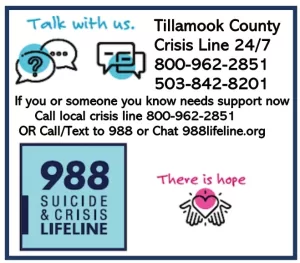By Paul Welch, MD, Chief Medical Officer at Adventist Health Tillamook
In today’s fast-paced world, where the demands of life can sometimes feel overwhelming, it’s essential that we place a strong emphasis on mental healthcare. Mental well-being is not just the absence of mental illness; it’s a state of emotional, psychological and social health. We must recognize the significance of mental health and prioritize it as a fundamental aspect of our overall well-being.
Depression, Often Misunderstood: Breaking the Stigma
Depression is a widespread mental health concern that affects millions of individuals, transcending age, gender and background. It is more than simply feeling sad; it is a complex health issue. “Depression affects much more than mood, and this is because the mind and body are interconnected. When we experience disruptions in our mental processes, the brain emits stress signals to the body, which can suppress overall health,” explains Amanda Creott, LCSW, a behavioral health provider at a sister Adventist Health location in Paradise, California. Depression is a sign of an imbalance that can ultimately affect physical health. However, the good news is that, like many other health disorders, depression is treatable.
Key Takeaways from the 2023 Study: Shedding Light on Mental Health
Recent findings from a 2023 study conducted by Mental Health America, a leading national nonprofit dedicated to the promotion of mental health, well-being and illness prevention, underscore the urgency of addressing mental health issues in our community. The study revealed that 21% of adults are experiencing at least one mental illness, roughly equating to 50 million people. Shockingly, 55% of adults with a mental illness have not received any treatment, emphasizing the need for increased awareness and access to mental health services. Additionally, 5.44% of adults experience severe mental illness, and over 12.1 million adults (4.8%) have reported serious thoughts of suicide, a figure that more than doubles when surveying adults who identify as two or more races. The states faring the poorest included Kansas, Arizona and Oregon, which all report high percentages of adults with mental illness and thoughts of suicide.
A Call for Community Partnership: The Holiday Season and Beyond
The holiday season is a time traditionally associated with joy and togetherness, but let us remember that not everyone may be feeling the festive spirit. The holiday season can be particularly challenging for those battling mental health issues. It‘s a time when loneliness and isolation can intensify, making it crucial for us to extend our support to those in need.
We, as a community, have the power to create a supportive and compassionate environment where individuals feel safe seeking help and sharing their struggles. By working together, we can ensure that no one faces mental health challenges alone. This holiday season and beyond, let us prioritize mental health, break the stigma surrounding it, and offer a helping hand to those who may be silently suffering.
It’s not just a responsibility; it‘s a testament to our strength as a caring community.
If you or someone you know needs help, call 988 or the local 24/7 crisis line at 503-842-8201 or 800-962-2851. There is help and hope.



